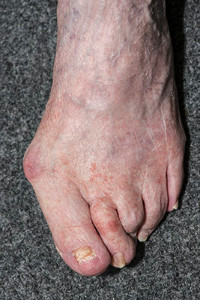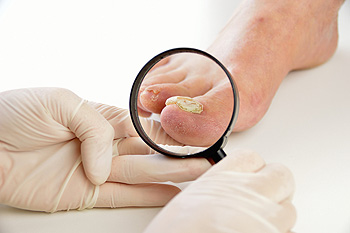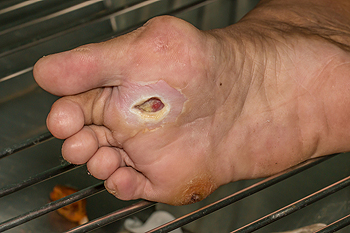April 2020
Where Does a Bunion Develop?
 A bunion is defined as a noticeable, bony bump that extends on the side of the big toe. It can gradually form as a result of wearing shoes that do not have adequate room for the toes to move freely in. Additionally, genetic factors may play a significant role in developing a bunion. Common symptoms that many patients endure often include pain, redness on or around the affected area, and there may be considerable discomfort while walking. Mild relief may be felt when larger shoes are worn that can accommodate the bunion, and it may be beneficial to wear custom made orthotics. If you see the beginning signs of a bunion, it is suggested that you consult with a podiatrist who can help you to determine what the correct treatment method is for you.
A bunion is defined as a noticeable, bony bump that extends on the side of the big toe. It can gradually form as a result of wearing shoes that do not have adequate room for the toes to move freely in. Additionally, genetic factors may play a significant role in developing a bunion. Common symptoms that many patients endure often include pain, redness on or around the affected area, and there may be considerable discomfort while walking. Mild relief may be felt when larger shoes are worn that can accommodate the bunion, and it may be beneficial to wear custom made orthotics. If you see the beginning signs of a bunion, it is suggested that you consult with a podiatrist who can help you to determine what the correct treatment method is for you.
If you are suffering from bunions, contact Dr. Anna Petrov of Family Foot & Ankle Care. Our doctor can provide the care you need to keep you pain-free and on your feet.
What Is a Bunion?
A bunion is formed of swollen tissue or an enlargement of boney growth, usually located at the base joint of the toe that connects to the foot. The swelling occurs due to the bones in the big toe shifting inward, which impacts the other toes of the foot. This causes the area around the base of the big toe to become inflamed and painful.
Why Do Bunions Form?
Genetics – Susceptibility to bunions are often hereditary
Stress on the feet – Poorly fitted and uncomfortable footwear that places stress on feet, such as heels, can worsen existing bunions
How Are Bunions Diagnosed?
Doctors often perform two tests – blood tests and x-rays – when trying to diagnose bunions, especially in the early stages of development. Blood tests help determine if the foot pain is being caused by something else, such as arthritis, while x-rays provide a clear picture of your bone structure to your doctor.
How Are Bunions Treated?
- Refrain from wearing heels or similar shoes that cause discomfort
- Select wider shoes that can provide more comfort and reduce pain
- Anti-inflammatory and pain management drugs
- Orthotics or foot inserts
- Surgery
If you have any questions, please feel free to contact one of our offices located in Wheeling and Chicago, IL . We offer the newest diagnostic and treatment technologies for all your foot care needs.
Why Are My Feet Swollen During Pregnancy?
 The joys and delights of pregnancy are often accompanied by sore and achy feet. This happens as a result of the growing fetus putting pressure on the lower extremities. The feet may become swollen and tired, which is why it can be beneficial to elevate them as often as possible during the day. Additionally, it may help to incorporate a gentle exercise program into your daily routine to keep your feet healthy during this time. Research has indicated the importance of avoiding high temperatures, as this can possibly help to diminish existing swelling. If you would like additional information about how to protect your feet during pregnancy, it is suggested that you schedule a consultation with a podiatrist.
The joys and delights of pregnancy are often accompanied by sore and achy feet. This happens as a result of the growing fetus putting pressure on the lower extremities. The feet may become swollen and tired, which is why it can be beneficial to elevate them as often as possible during the day. Additionally, it may help to incorporate a gentle exercise program into your daily routine to keep your feet healthy during this time. Research has indicated the importance of avoiding high temperatures, as this can possibly help to diminish existing swelling. If you would like additional information about how to protect your feet during pregnancy, it is suggested that you schedule a consultation with a podiatrist.
Pregnant women with swollen feet can be treated with a variety of different methods that are readily available. For more information about other cures for swollen feet during pregnancy, consult with Dr. Anna Petrov from Family Foot & Ankle Care. Our doctor will attend to all of your foot and ankle needs.
What Foot Problems Can Arise During Pregnancy?
One problem that can occur is overpronation, which occurs when the arch of the foot flattens and tends to roll inward. This can cause pain and discomfort in your heels while you’re walking or even just standing up, trying to support your baby.
Another problem is edema, or swelling in the extremities. This often affects the feet during pregnancy but tends to occur in the later stages.
How Can I Keep My Feet Healthy During Pregnancy?
- Wearing orthotics can provide extra support for the feet and help distribute weight evenly
- Minimize the amount of time spent walking barefoot
- Wear shoes with good arch support
- Wear shoes that allow for good circulation to the feet
- Elevate feet if you experience swelling
- Massage your feet
- Get regular, light exercise, such as walking, to promote blood circulation to the feet
If you have any questions please feel free to contact one of our offices located in Wheeling and Chicago, IL . We offer the newest diagnostic and treatment technologies for all your foot and ankle needs.
Are You Suffering From Ingrown Toenails?
Common Signs You May Have Toenail Fungus
 There are noticeable signs you may have developed toenail fungus. These often include the nail appearing thick, yellowed, and unsightly. It may target the big toenail first, then gradually spread to the other toenails. Many patients who have this ailment notice there can be an unpleasant odor that comes from the nails. This may be a result of fungus that has gathered under the nail, and the odor may continue to be there after the feet have been washed. In severe cases, the toenail may fall off, and will grow back normally when correct treatment begins. For stubborn cases of toenail fungus, it is suggested that you consult with a podiatrist who can prescribe medication that can effectively treat this condition.
There are noticeable signs you may have developed toenail fungus. These often include the nail appearing thick, yellowed, and unsightly. It may target the big toenail first, then gradually spread to the other toenails. Many patients who have this ailment notice there can be an unpleasant odor that comes from the nails. This may be a result of fungus that has gathered under the nail, and the odor may continue to be there after the feet have been washed. In severe cases, the toenail may fall off, and will grow back normally when correct treatment begins. For stubborn cases of toenail fungus, it is suggested that you consult with a podiatrist who can prescribe medication that can effectively treat this condition.
For more information about treatment, contact Dr. Anna Petrov of Family Foot & Ankle Care. Our doctor can provide the care you need to keep you pain-free and on your feet.
Toenail Fungus Treatment
Toenail fungus is a condition that affects many people and can be especially hard to get rid of. Fortunately, there are several methods to go about treating and avoiding it.
Antifungals & Deterrence
Oral antifungal medicine has been shown to be effective in many cases. It is important to consult with a podiatrist to determine the proper regiment for you, or potentially explore other options.
Applying foot powder on the feet and shoes helps keep the feet free of moisture and sweat.
Sandals or open toed shoes – Wearing these will allow air movement and help keep feet dry. They also expose your feet to light, which fungus cannot tolerate. Socks with moisture wicking material also help as well.
If you have any questions please feel free to contact one of our offices located in Wheeling and Chicago, IL . We offer the newest diagnostic tools and technology to treat your foot and ankle needs.
Why Do Foot Ulcers Develop?
 Patients who have diabetes may be aware of the importance of properly caring for their feet. This can help to prevent the painful condition that is known as a diabetic foot ulcer. This type of wound may develop as a result of the inability of feeling a small cut on the foot, and it may quickly become infected. This can happen from elevated glucose levels in the blood, which may hinder the body’s capability to heal properly. Mild relief and proper healing may come from keeping weight off of the foot, and it may help to elevate it often. It is imperative that proper dressings are used as the healing process takes place, in addition to keeping the foot as clean and as dry as possible. If you have diabetes, it is strongly suggested that you seek the counsel of a podiatrist who can properly treat this condition.
Patients who have diabetes may be aware of the importance of properly caring for their feet. This can help to prevent the painful condition that is known as a diabetic foot ulcer. This type of wound may develop as a result of the inability of feeling a small cut on the foot, and it may quickly become infected. This can happen from elevated glucose levels in the blood, which may hinder the body’s capability to heal properly. Mild relief and proper healing may come from keeping weight off of the foot, and it may help to elevate it often. It is imperative that proper dressings are used as the healing process takes place, in addition to keeping the foot as clean and as dry as possible. If you have diabetes, it is strongly suggested that you seek the counsel of a podiatrist who can properly treat this condition.
Diabetic foot care is important in preventing foot ailments such as ulcers. If you are suffering from diabetes or have any other concerns about your feet, contact Dr. Anna Petrov from Family Foot & Ankle Care. Our doctor can provide the care you need to keep you pain-free and on your feet.
Diabetic Foot Care
Diabetes affects millions of people every year. The condition can damage blood vessels in many parts of the body, especially the feet. Because of this, taking care of your feet is essential if you have diabetes, and having a podiatrist help monitor your foot health is highly recommended.
The Importance of Caring for Your Feet
- Routinely inspect your feet for bruises or sores.
- Wear socks that fit your feet comfortably.
- Wear comfortable shoes that provide adequate support.
Patients with diabetes should have their doctor monitor their blood levels, as blood sugar levels play such a huge role in diabetic care. Monitoring these levels on a regular basis is highly advised.
It is always best to inform your healthcare professional of any concerns you may have regarding your feet, especially for diabetic patients. Early treatment and routine foot examinations are keys to maintaining proper health, especially because severe complications can arise if proper treatment is not applied.
If you have any questions please feel free to contact one of our offices located in Wheeling and Chicago, IL . We offer the newest diagnostic and treatment technologies for all your foot and ankle needs.







